Arnica montana seeds, organic
Price range: $4.95 through $29.00
Family: Aster (Asteraceae)
Hardy to Zones 4 to 9, best at elevation up to 6,000 feet
Clump forming alpine herbaceous perennial native to the the mountains of Central Europe. Flowers very large, on long, sturdy stalks. This is the official plant. Traditional usage (TWM): antiinflammatory. Standard preparations include tincture, homeopathic, oil infusion, salve and cream. Arnica montana makes sturdy clumps in the native habitat, and should be planted in moist, acidic soil in the full sun at 1 to 2 feet between the plants, in order to approximate the natural spacing requirements. We have had some success with growing these at around 2,000 feet elevation, and have received reports of good success from folks living at 8,000 feet in the Rockies. Plant prefers a moist, lime-free, acidic loam soil in part shade or sun. Does well in rock gardens. At low elevation, give moist shade. To cultivate, use standard flower seed planting method, where the seeds are pressed into spongy potting soil and kept evenly moist and cool (60 to 70 degrees F, no bottom heat) until germination, which occurs in a couple of weeks. Light dependent germinator. Work up in pots before transplant.
Packet contains 30 Seeds
1 g contains ~670 seeds
Certified Organically Grown

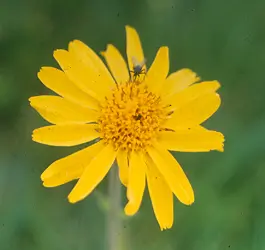
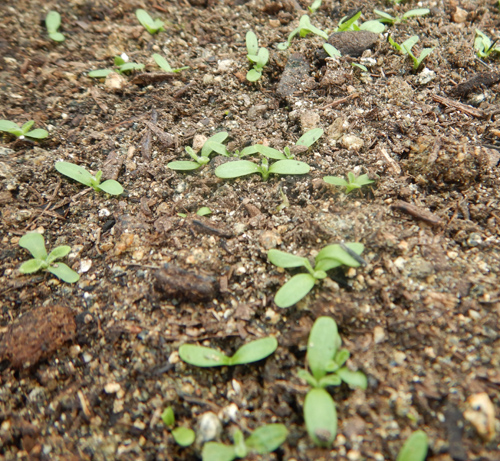
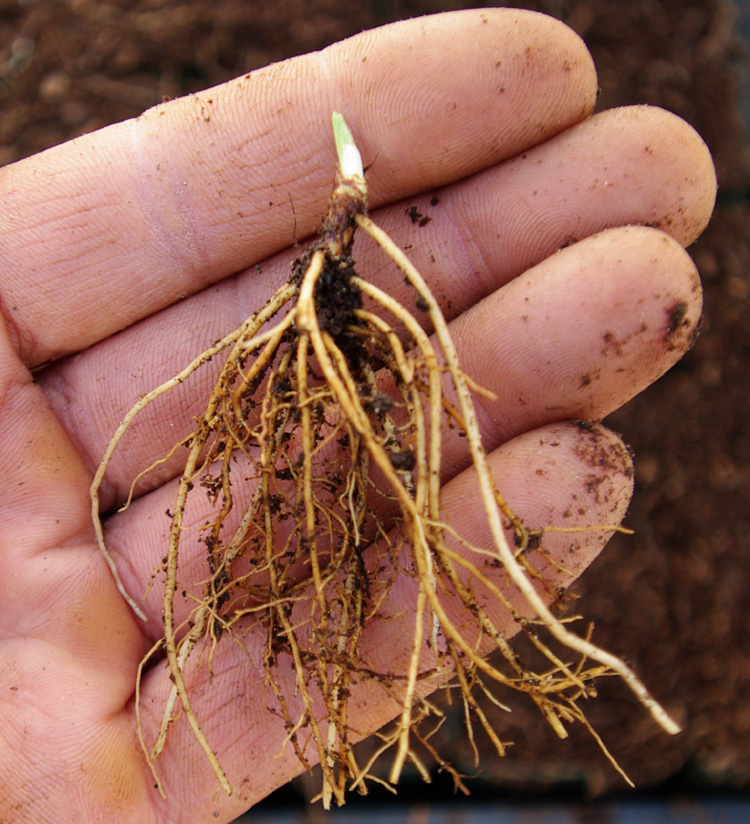
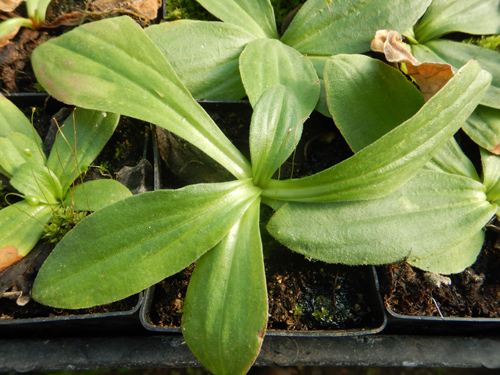

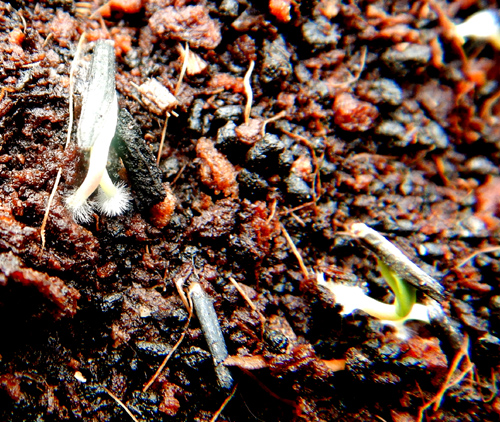
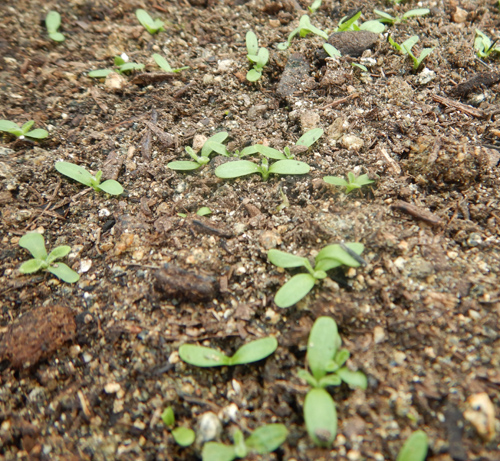

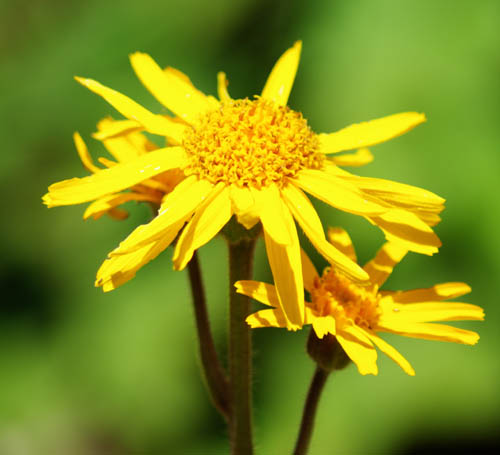
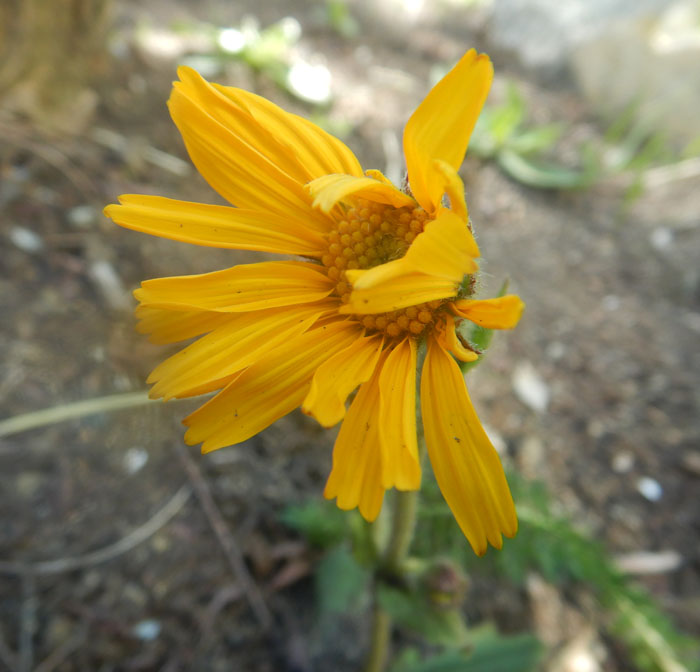
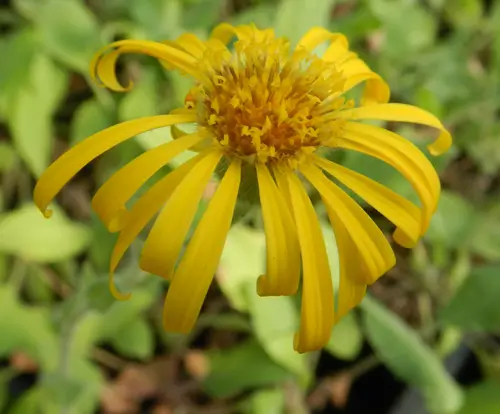

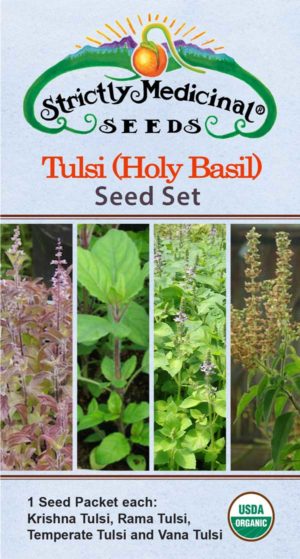
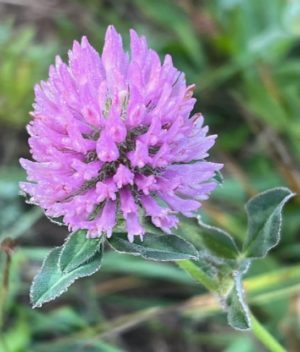
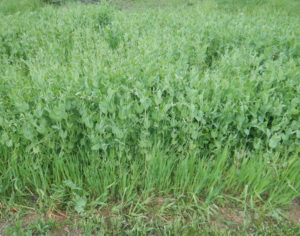
Question
Ria –
Would Arnica Montana grow well in New Hampshire, right in the middle of the state and a bit shy of half way up, at about 960 feet elevation? We have some temporary water logging each spring thaw but it doesn’t stick around more than a day or two. I can plant in all sun or partial shade, near a stream or set back from it or raised beds. Thank you!
Upvote if this was helpful (0) Downvote if this was not helpful (0) Watch Unwatch Flag for removal
Richo Cech –
Hello ria,
Thanks for writing. Perhaps surfing the wave of success I’ve had this year planting Arnica montana from seed, I am encouraging you to go ahead with it. all the spots you describe sound good! Its an alpine plant–almost goes without saying that it will be covered by snow and drowned in snowmelt at certain times of the year but. . . it doesn’t mind! richo
Upvote if this was helpful (0) Downvote if this was not helpful (0) Flag for removal
Maria Imre –
Hello, I am planing to order Arnica montana seeds, but I am living in zone 9 A costal. What do you think, it would survive?
Upvote if this was helpful (1) Downvote if this was not helpful (0) Flag for removal
Richo Cech –
Hello Maria, Thanks for contacting. Coastal is a special niche that allows for greater flexibility. I would try both Arnica monmtana and Arnica chamissonis and work with the one that does best for you. The flowers are medicinally interchangeable. Richo
Upvote if this was helpful (0) Downvote if this was not helpful (0) Flag for removal
Bethany –
I live in zone 6, southern Illinois. Would this grow there?
Upvote if this was helpful (0) Downvote if this was not helpful (0) Flag for removal
Richo Cech –
Hi Bethany, Probably better to grow the more humidity-tolerant Arnica chamissonis. Richo
Upvote if this was helpful (0) Downvote if this was not helpful (0) Flag for removal
Question
Zoila Avila –
Hello
I’m in the high desert ca about 4,000 ft elevation. Which Arnica plant do you recommend.
Upvote if this was helpful (0) Downvote if this was not helpful (0) Watch Unwatch Flag for removal
Richo Cech –
Hello Zoila, Thanks for contacting. The Arnica chamissonis (meadow arnica) is more drought-tolerant than the Arnica montana and will be trouble-free for you. If you can keep the planting moist, then since you’re at elevation, the Arnica montana is also a workable choice–nothing better than those heady blossoms! Richo
Upvote if this was helpful (0) Downvote if this was not helpful (0) Flag for removal
Question
Aimee –
Do you think I can grow this in Pollock Pines CA? Which variety would you recommend? I just found your website and am obsessed! TIA
Upvote if this was helpful (0) Downvote if this was not helpful (0) Watch Unwatch Flag for removal
Richo Cech –
Hello Aimee, Thanks for writing. Good terminology, yes, plants are our obsession. You’re at almost 4000 feet elevation in Pollock Pines. You can grow Arnica montana. You might also want to grow Arnica chamissonis, just as a failsafe. Richo
Upvote if this was helpful (0) Downvote if this was not helpful (0) Flag for removal
Lisa –
Hello, I’m so excited to hear that arnica may be able to be grown in the US! We live in Wisconsin dells, WI with VERY sandy soil- which type would you recommend that is still good medicinal quality?? Thank you!
Upvote if this was helpful (0) Downvote if this was not helpful (0) Flag for removal
Richo Cech –
Hello Lisa,
Thanks for contacting. I have fond memories of the Wisconsin Dells where my dad saved me from drowning when I was a toddler. Arnica chamissonis is rhizomatous and does very well in sandy soils–I’ve tried it–and is a good choice for medicinal activity. Richo
Upvote if this was helpful (3) Downvote if this was not helpful (0) Flag for removal
Question
Jimmy Johnson –
We are in Southern Illinois, elevation 571 ft. What do you recommend?
Upvote if this was helpful (0) Downvote if this was not helpful (0) Watch Unwatch Flag for removal
Richo Cech –
hi Jimmy.
Love southern illinois. Spent two summers in Kampsville at the Koster archaeological site. You have intense summers with high humidity–I suggest Meadow Arnica (Arnica chamissonis) instead of this Arnica montana. They are medicinally interchangeable. richo
Upvote if this was helpful (0) Downvote if this was not helpful (0) Flag for removal
CeAnne –
What arnica would you recommend for 600 ft above sea level in the PNW Oregon on the foothills?
Upvote if this was helpful (0) Downvote if this was not helpful (0) Flag for removal
Richo Cech –
Hello CeAnne, Thanks for writing. I would recommend the Arnica chamissonis, which is easy to grow, high-yielding and essentially the same medicinal quality as Arnica montana. richo
Upvote if this was helpful (0) Downvote if this was not helpful (0) Flag for removal
Shelby –
Hey there I’m at 1200 feet in southern Oregon . It’s hot dry summers but I also have a green house . Do you think arnica Montana would grow in grants pass ? Thanks!
Upvote if this was helpful (0) Downvote if this was not helpful (0) Flag for removal
Richo Cech –
hi shelby, we’re in williams and have plenty of Arnica montana growing. You’re at a lower elevation, I suggest growing Arnica chamissonis, it is a somewhat easier growout and the medicinal effects are identical, richo
Upvote if this was helpful (0) Downvote if this was not helpful (0) Flag for removal
Question
isabelleherbert –
Hello Richo,
I live in Santa Cruz in Ca. Which arnica would you recommend growing?
Upvote if this was helpful (0) Downvote if this was not helpful (0) Watch Unwatch Flag for removal
Richo Cech –
hello isabelle, thanks for writing. Arnica chamissonis. richo
Upvote if this was helpful (3) Downvote if this was not helpful (0) Flag for removal
Olivia Burnside –
Hi Richo! Which arnica would you recommend for Middle Tennessee?
Upvote if this was helpful (0) Downvote if this was not helpful (0) Flag for removal
Richo Cech –
Hi Olivia, Thanks for writing. Love tennessee! I’d recommend meadow arnica, Arnica chamissonis. richo
Upvote if this was helpful (0) Downvote if this was not helpful (0) Flag for removal
Tristan –
I was about to ask Richo a question about internal arnica usage and I just remembered I have his book “making plant medicine” which sure enough had the information I was looking for and is a wonderful book but beware he only signed his name in pencil with a heart below on the “growing at-risk medicinal herbs” book, not this one but your experience may differ. Hopefully some more arnica montana seeds/plants will come in stock soon although it appears Arnica, Meadow (Arnica chamissonis) is interchangeable with Arnica montana for its antiinflammatory effects so I may order those seeds for now.
Upvote if this was helpful (0) Downvote if this was not helpful (0) Watch Unwatch Flag for removal
Richo Cech –
hi tristan, just wanted to say thanks for the review, i appreciate it. you can expect something in the mail from me. richo
Upvote if this was helpful (2) Downvote if this was not helpful (0) Flag for removal
Question
Erika –
Would i be able to grow arnica montana in new jersey Zone 7? I have very sandy soil.
Upvote if this was helpful (0) Downvote if this was not helpful (0) Watch Unwatch Flag for removal
Richo Cech –
it is never too late to start perennials
Upvote if this was helpful (1) Downvote if this was not helpful (0) Flag for removal
Question
Janessa –
I have heartleaf arnica growing all around me. Do you know how this compares medicinally to montana?
Upvote if this was helpful (0) Downvote if this was not helpful (0) Watch Unwatch Flag for removal
Richo Cech –
hi janessa, they’re all interchangeable. r
Upvote if this was helpful (0) Downvote if this was not helpful (0) Flag for removal
Question
Graham –
Do you ship seeds to New Zealand.
Upvote if this was helpful (0) Downvote if this was not helpful (0) Watch Unwatch Flag for removal
Richo Cech –
we can’t do this successfully anymore, i am sorry
Upvote if this was helpful (0) Downvote if this was not helpful (0) Flag for removal
Question
Eimi –
Hi Richo,
I really want to grow Arnica Montana for medicinal use, but I worry it might not do well in Central Texas (zone 8b, 450 ft elevation). Could you recommend a suitable substitute that have similar medicinal properties and heat tolerant? Thank you much in advance!
Upvote if this was helpful (0) Downvote if this was not helpful (0) Watch Unwatch Flag for removal
Richo Cech –
hello eimi, thanks for contacting. an easy substitute for arnica montana is calendula. both are daisy family antiinflammatories. Mexican arnica (Heterotheca inuloides) is a really god choice for texas and the plant does resemble arnica montana and is heat tolerant. Arnica chamissonis is the closest in activity and is far easier to grow than montana. you could even try helichrysum which is pretty heat tolerant and does have some arnica-like activity. r
Upvote if this was helpful (0) Downvote if this was not helpful (0) Flag for removal
Eimi –
Thank you Richo for the suggestions! Time to do more seed shopping! Which calendula variety would you recommend for my area?
Upvote if this was helpful (0) Downvote if this was not helpful (0) Flag for removal
Richo Cech –
hello eimi, i always recommend orange calendula, it is the best. r
Upvote if this was helpful (0) Downvote if this was not helpful (0) Flag for removal
John Wright –
I’m in Roswell, NM with very alkaline soil and would like to grow arnica, any suggestions? Thanks
Upvote if this was helpful (0) Downvote if this was not helpful (0) Flag for removal
Richo Cech –
hi john, yes, opt for mexican arnica (Heterotheca inuloides). richo
Upvote if this was helpful (0) Downvote if this was not helpful (0) Flag for removal
Question
Matt –
Where do you source your genetics? I would like to plant a large field to harvest for years to come, and I am trying to get the best plant possible. I also live around 8,200’ in Colorado. Is this strain subtle?
Upvote if this was helpful (0) Downvote if this was not helpful (0) Watch Unwatch Flag for removal
Richo Cech –
Hi Matt, the germplasm for our Arnica montana originated in the French Pyrenees and is now organically grown. It makes sense for any up-and-coming grower to grow the official species, which is Arnica montana. That way people will trust it, and buy it, etc. There is one small exception, which is that Arnica chamissonis is an accepted substitute (German Commission E) and is easier to grow. But if you’re at altitude, then montana makes sense. Richo
Upvote if this was helpful (3) Downvote if this was not helpful (0) Flag for removal
Question
Nela Cardenas –
Hi Richo it is possible shipping seeds to Chile? Thanks1
Upvote if this was helpful (0) Downvote if this was not helpful (0) Watch Unwatch Flag for removal
Richo Cech –
hi nela, not really, not successfully. richo
Upvote if this was helpful (0) Downvote if this was not helpful (0) Flag for removal
Question
Gus Gus –
howdy! if we order 1g of arnica seeds to florida, clearwater beach, would you know on what date it would arrive by regular shipping and also alternately with expedited shipping? thanks!
Upvote if this was helpful (0) Downvote if this was not helpful (0) Watch Unwatch Flag for removal
Richo Cech –
Hello Gus, We’re giving appx. 2-day turnaround on seed orders right now, and standard shipping is first class mail USPO. Frankly the standard shipping appears to be arriving just as fast as priority mail shipping, so your most expedited approach would be to order immediately and we will endeavor to give fast turnaround. Richo
Upvote if this was helpful (0) Downvote if this was not helpful (0) Flag for removal
Cindy –
I am in western Michigan (Manistee area) and wonder the same thing!! Help lol
Upvote if this was helpful (0) Downvote if this was not helpful (0) Watch Unwatch Flag for removal
Richo Cech –
Hi Cindy,
German Commission E many years ago approved Arnica chamissonis as a functional substitute for Arnica montana, so you can just grow that. We recently used our seeds to produce 400 seedlings that we’re potting up for sale and so I really trust that seed. However the Arnica montana seed is equally viable and the thing to remember about growing the arnicas is that they really abhor lime, so standard potting soils that are pH balanced are no bueno. Use a peat-based soil. 80% peat with 20% worm cast works great. Plant your arnica in a lime-free bed (acidic soils only). There’s really no substitute for arnica so we need to learn to grow it. richo
Upvote if this was helpful (1) Downvote if this was not helpful (0) Flag for removal
edensgrace –
I live in Michigan, with pines and some shading….sounds just like what I was hoping to hear!
Upvote if this was helpful (0) Downvote if this was not helpful (0) Watch Unwatch Flag for removal
Question
Spring –
I live in Georgia, is there a certain type of arnica best suited for my area, I’m a zone 7b-8a?
Upvote if this was helpful (0) Downvote if this was not helpful (0) Watch Unwatch Flag for removal
Richo Cech –
Hello Spring,
Thanks for contacting us. Probably Meadow Arnica (Arnica chamissonis) is going to be your best choice, in that it is a true arnica and quite heat tolerant. Another option might be Mexican Arnica (Heterotheca inuloides) that proves to be very robust in the South. It isn’t a true arnica but is used interchangeably by many.
Richo
Upvote if this was helpful (0) Downvote if this was not helpful (0) Flag for removal
Courtney Cocke –
Thank you so much!!
Upvote if this was helpful (0) Downvote if this was not helpful (0) Watch Unwatch Flag for removal
Question
Frankie Hall –
Hi there. I live in Central Missouri. Zone 5. I want to grow the best Arnica for my area. What do you suggest?
Upvote if this was helpful (0) Downvote if this was not helpful (0) Watch Unwatch Flag for removal
Richo Cech –
Hi Frankie,
Thanks for contacting! If you’re in the Ozark Highlands then you might get away with growing Arnica montana. If you’re in the plains I would recommend meadow arnica (Arnica chamissonis). Actually an easy grow for those in the know.
Richo
Upvote if this was helpful (0) Downvote if this was not helpful (0) Flag for removal
Courtney –
I live in East Tennessee. Our summers are hot and humid. If I planted these in pots with a good mix (as to avoid our heavy clay) and placed them in a cooler woodland microclimate on our property, do you think they would do ok? I’m thinking part sun here in zone 7. What are your thoughts? Thank you!
Upvote if this was helpful (0) Downvote if this was not helpful (0) Watch Unwatch Flag for removal
Richo Cech –
Hi Courtney,
Its not that different from me planting them here, except that our summers are more dry heat than humid. It can be made to work as you describe–use a peat-based mix to increase acidity. As you probably know the Arnica chamissonis is interchangeable medicinally and significantly more adaptable.
Richo
Upvote if this was helpful (0) Downvote if this was not helpful (0) Flag for removal
Mark –
I’m at 3020′ elevation in Western North Carolina, would arnica montana work well here? It can be quite wet, last year was particularly rainy.
Upvote if this was helpful (0) Downvote if this was not helpful (0) Watch Unwatch Flag for removal
Richo Cech –
Hello Mark, This does sound like a good area for Arnica montana, and we do have some particularly fresh and viable seed in stock right now. I grow it successfully here at 1600 feet in Southern Oregon. Rain is a good thing! You have a lot of acidic soils out there, too, which is also important for Arnica montana. I would grow some Arnica chamissonis at the same time–most people get better results with that species. richo
Upvote if this was helpful (0) Downvote if this was not helpful (0) Flag for removal
Tasha –
Can I grow arnica at 371ft elevation?
Upvote if this was helpful (0) Downvote if this was not helpful (0) Watch Unwatch Flag for removal
Richo Cech –
Hello Tasha, Yes, and the Arnica chamissoinis would be an even better (more flower productive) choice. Richo
Upvote if this was helpful (1) Downvote if this was not helpful (0) Flag for removal
Question
Ingrid –
Companion planting suggestions? I have a badly rocked in space that I suddenly envision as a medicinal rock garden…..
Upvote if this was helpful (0) Downvote if this was not helpful (0) Watch Unwatch Flag for removal
Richo Cech –
Hello Ingrid,
When it comes to medicinal herb growing, rocks can be a great advantage. Some of the plants I see growing in rocky zones where there is altitude and moisture (and I’m headed in that direction because you mention Arnica montana) are angelica, yellow gentian, tibetan gentian, rupturewort, creeping rosemary, yerba del lobo, valerian and yarrow. Check the link for more info on rock gardening
https://blog.strictlymedicinalseeds.com/where-and-how-to-grow-an-herbal-groundcover/
Richo
Upvote if this was helpful (1) Downvote if this was not helpful (0) Flag for removal
Question
Diane –
I have been told by a very experienced botanist/herbalist that —unlike most herbs— Arnica Montana must be used in its fresh state (as opposed to dried) for full medicinal purposes. I have not found any information to support this theory. Do you have any information of such? Or can you refer me to a resource that may?
Upvote if this was helpful (0) Downvote if this was not helpful (0) Watch Unwatch Flag for removal
Admin Richo Cech –
Hello Diane,
Thanks for your note. You can check Making Plant Medicine on page 112-114 for recipes using both the dried and the fresh plant/flowers of Arnica montana. For tincture making, the fresh herb is very nice. The tincture of the dried herb is somewhat stronger. For oil extraction (the oil infusion) the dried plant is preferable, as the water in the fresh herb is inimical to the oil. Richo
Upvote if this was helpful (0) Downvote if this was not helpful (0) Flag for removal
MainnAh –
Thanks for all the info. Does it matter if the flowers go to seed while drying, will it effect the end product potency? I plan on using it topically so flavor isn’t a factor. If this works well with coconut oil I wonder if my infusion method for cannabis would work where you cook the oil, flower, and water together then strain/cool and remove the solid coconut oil that’s infused. That method removes impurities and chlorophyll but I don’t know if it works exactly the same for arnica. If it’s properties are oil based then in theory it should
Upvote if this was helpful (0) Downvote if this was not helpful (0) Flag for removal
Richo Cech –
Hello there! you are right, the flowers tend to go to seed when dried. Pick early to keep this to a minimum. It the sample goes to seed on the drying screen, the potency of sesquiterpene lactones remains the same, but the antiinflammatory flavonoids will be diminished. The method you’re describing is pretty specific for cannabis and isn’t usually used for arnica. A lot of activity would be lost to the water fraction, and fast heating at high temps is contraindicated. You can find the time tested method for making oil infusion of arnica and other herbs in my book “making plant medicine.” But in short, digest the dried flowers slowly in warm olive oil with frequent stirring. Richo
Upvote if this was helpful (0) Downvote if this was not helpful (0) Flag for removal